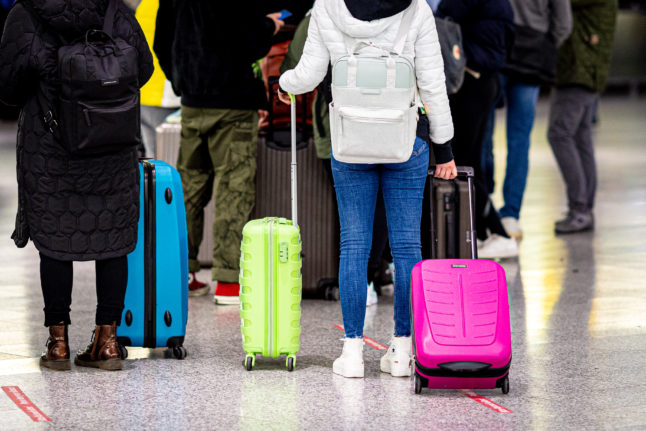It means that anyone who wants to enter Germany from abroad still has to stick to the coronavirus entry rules.
Before coming to Germany, people over the age of 12 are asked to upload or show their Covid documents (proof of vaccination, recovery or a negative test) while checking in or before boarding. This is known as the 3G rule in Germany.
Travellers who are transferring at an airport in Germany also have to present proof of their Covid status before arriving in the country. This applies both to non-Schengen transit from or to third countries outside the EU and to transit from or to Schengen states.
People driving or travelling into Germany on other transport also have to carry this proof. Random checks near borders can be carried out, however, in reality this doesn’t happen often.
The government extended the regulation, which would have expired on Thursday, until May 31st. It is unclear if it will be extended again or dropped after this date.
READ ALSO: How Germany’s travel rule changes may affect your holiday plans
Are there any quarantine rules?
At the beginning of March, Germany changed its Covid travel regulations, removing all countries from its high-risk list.
Authorities said the move was because the Omicron variant of coronavirus was found to cause less severe illness than previous Covid variants.
They said that countries will be classed as ‘high risk’ in future “where there is a high incidence in terms of the spread of variants with higher virulence, compared to the Omicron variant”.
Since no countries are currently on the risk list, people don’t have have to fill in a digital entry form before travelling to Germany. The proof of vaccination, recovery or test is enough.
People should, however, keep track of any risk-level changes to countries they are travelling to Germany from on the Robert Koch Institute’s risk list.
And if a country is classed as high-risk, those who are not vaccinated will have to quarantine. If a region is classed as a ‘virus variant area’, tough quarantine and testing rules come into force for all arrivals to Germany – even those who are vaccinated.
What else should I know about Germany’s restrictions?
In general, you have to be fully vaccinated (with an EMA-approved vaccine) to enter Germany if you are coming from most non-EU countries. Unvaccinated people are not allowed to enter unless they have an essential reason.
Germany does, however, allow unrestricted entry for people coming from a small group of ‘safe list’ countries.
The ban on entry does not apply to German citizens or members of their immediate family and to citizens of EU and associated states and members of their immediate family.
People can generally enter Germany from other countries in the EU even if unvaccinated (but they still have to take a test before travel).
The Health Ministry confirmed to The Local that the “extension of the Coronavirus Entry Ordinance was approved by the cabinet” on Wednesday.
“It will apply until the end of May 2022,” the spokesman said.
Information SMS on entry to Germany shelved
From Friday onwards the information text message on Covid regulations in Germany, which network operators had to send to the phones of people entering the country, will be dropped.
Sending the SMS caused high monthly costs for operators – for instance it cost about €400,000 to send texts to travellers with foreign mobile phone operators.



 Please whitelist us to continue reading.
Please whitelist us to continue reading.
“In general, you have to be fully vaccinated (with an EMA-approved vaccine) to enter Germany if you are coming from most non-EU countries. Unvaccinated people are not allowed to enter unless they have an essential reason.”
This is no longer the policy.
What are the rules to enter this country from outside an EU Member State or Schengen Associated country?
Document checklist
Travellers over the age of 12 must carry with them proof of vaccination, recovery or a negative test result (PCR or antigen). Documents equivalent to the ‘EU Digital COVID Certificate’ (EUDCC) are accepted if they meet the same requirements:
Proof of vaccination after receiving full vaccination. Vaccine certificates are valid for 270 days. Vaccines authorized by the European Union (EU) or vaccines which are licensed in a third country and identical in formulation to a vaccine in the EU are accepted.
Or
Proof of recovery showing a positive PCR test result carried out at least 28 days but no more than 90 days prior.
Or
Negative result to a test taken no earlier than 48 hours before the actual time or scheduled time of entry. Where entry takes place using a carrier, the scheduled time of departure is decisive.